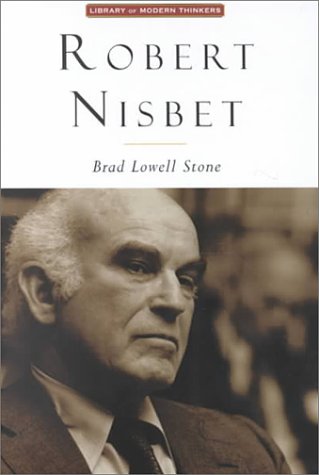This compact and thoughtful biography by the director of American Studies at Oglethorpe University underscores a recurrent problem affecting the reputations of conservative social thinkers. Even those who once enjoyed well-deserved celebrity cease to be widely studied after they are gone. Save for the interest of devoted disciples with quite limited media access, the contemporary thinkers I grew up admiring have not succeeded in attracting the attention of a later, more self-satisfied generation. By providing a highly readable intellectual biography of a brilliant social theorist who expressed politically unfashionable opinions. Brad Lowell Stone does for Robert Nisbet what Samuel Francis did for James Burnham. In Nisbet’s case, the need for such an act of retrieval may seem all the more remarkable, given the academic fame and publishing successes he enjoyed during his life. The author of distinguished books that sold well (including The Quest for Community (1952), The Sociological Tradition (1967), and The Twilight of Authority (1975)), Albert Schweitzer Professor of Humanities at Columbia University, and a recipient of—among many honors—the NEH’s Jefferson Lectureship and the Ingersoll Foundation’s Richard M. Weaver Award, Nisbet was among the most respected of all American social thinkers at the time of his death in 1996. What he did not receive was the voluminous gushing praise bestowed on that ponderous nostalgic and Trotskyist lamenter of totalitarianism, Hannah Arendt; the dissipated boy wonder of Marxist-Leninist posturing, C. Wright Mills; or Daniel Bell and Talcott Parsons, neither of whom has managed to construct a lucid paragraph or even a single passage unbesmirched by unsightly jargon. (Robert Nisbet, by contrast, was an elegant stylist.)
Making Nisbet appear relevant to today’s readers is a task made more difficult by the fact that he rallied to all the wrong causes. A Taft Republican who heartily despised the New Deal and its later reincarnations, a skeptic in religions matters who expressed revulsion for the Religious Right, and a personal friend of Richard Nixon, Nisbet today would be as unlikely to be invited to speak at CPAC as at a plenary gathering of American academic sociologists. One of his signal scholarly contributions was to popularize (if that is the term) the social commentary of 19th century conservative critics of the French Revolution. Nisbet emphasized the close links between traditionalist defenders of community faced with revolutionary upheaval and the birth of sociology as a body of knowledge and field of inquiry. He argued persuasively that the fathers of his discipline were not social radicals such as Marx, but Louis de Bonald, Frederic Le Play, Albrecht von Haller, and other apologists for disintegrating aristocratic societies, trying to make sense of their time. Even Durkheim and Tönnies were drawn to the insights of conservatives when examining and describing traditional societies. Nisbet, himself a conservative, sought to restore to his field its original identity, which had been pushed aside in favor of the ideologically more congenial one fashioned by his colleagues.
Stone sees as a main bridge between Nisbet’s work and the present age the stress on intermediate institutions as the foundation of a free society. Nisbet never deluded himself into believing that individuals bent on self-gratification provided a bulwark against state power. To the contrary, he thought that the pleasures and “rights” claimed by them fortified the central state in its role as champion of alleged victims of unenlightened communities and kin groups. While Nisbet certainly never believed that all communities are free from repression, he did perceive the inevitable tie between administrative control exercised by intrusive government and the war against inherited social authorities. He also questioned, as Stone reminds us in his perceptive concluding chapter, whether laissez-faire economics was of any great value in reining in social engineers. Nisbet assumed that economic progress brought social dislocation and led ultimately to the expansion of public administration.
Stone is also correct to distinguish Nisbet’s notion of “social capital” from the one pushed by such left-liberal sociologists as Robert Bellah and Robert Putnam. While their ilk associate social resources with “economic or political structures” and with the strengthening of “public institutions,” Nisbet valued the cognitive and social development of individuals in families and self-sustaining communities. He rejected both what he thought to be “cancerous individualism” and the depersonalizing effects of the managerial state. And Nisbet did not hesitate to break even further with the progressive mindset by turning for his models of social integration to the communal, rural Euro-American past. Stone observes that any serious examination of a civil society not fashioned or recreated by the central state must begin with Nisbet’s understanding of the human personality, which was demonstrably—and by no means coincidentally—the one favored by Aristotle.
[Robert Nisbet: Communitarian Traditionalist, by Brad Lowell (Stone Wilmington: ISI Books) 109 pp., $19.95]

Leave a Reply